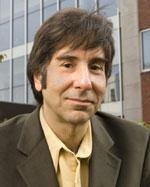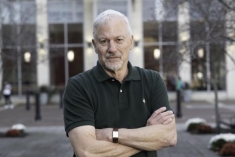Best Wishes to Our Retiring Faculty
Please join us in celebrating the distinguished careers of Rutgers Law School faculty who are retiring soon or have retired this past academic year. Each professor has left an indelible mark on the law school community and the legal field around the world.
Gary Francione
Jay Feinman
Phil Harvey
Robert Holmes
Alan Hyde
Rayman Solomon

Board of Governors Distinguished Professor Gary L. Francione, a graduate of the University of Rochester, attended the University of Virginia for both graduate school in philosophy and for law school. He was Articles Editor of the University of Virginia Law Review. After graduation in 1981, he clerked for the late Judge Albert Tate, Jr., United States Court of Appeals for the Fifth Circuit, and then for the late Justice Sandra Day O’Connor. After practicing at Cravath, Swaine & Moore in New York City, he joined the Faculty of the University of Pennsylvania Law School where he received tenure in 1987. He joined the Rutgers-Newark Faculty in 1989. He believed strongly in a central goal of the Newark mission: to provide a rigorous, quality legal education to those who came from groups that had historically been deprived of access to such an education.
Professor Francione taught courses in torts, criminal law, criminal procedure, legal philosophy, logic for lawyers, evidence, environmental law, and administrative law.
His scholarship included articles on constitutional law and intellectual property, but his primary focus was on animal law and ethics. His 1995 book, Animals, Property, and the Law, is regarded as changing the landscape as to how we think and talk about animals in the legal system. In that book, he provided a carefully researched and documented analysis showing how the property status of animals meant that animal welfare standards would do little more than make animal use more economically efficient. He followed this book with five more books on animal law and animal ethics, and dozens of articles, book chapters, and encyclopedia entries dealing with various aspects of animals and the law, and the philosophical/ethical issues concerning animals. He developed a theory of animal rights based only on animal sentience, or subjective awareness, and involving no additional cognitive characteristics. His work became known and respected internationally, resulting in his promotion to Distinguished Professor in 1996, and to Board of Governors Professor in 2013. Professor Francione has lectured on the topic of animal law and ethics throughout the U.S., Canada, and Europe, and was a keynote speaker in the first international conference on animal rights held in Israel at the University of Tel Aviv in 1990.
In 1990, he started the Rutgers Animal Rights Law Clinic, the first entity of its kind anywhere. Students received academic credit for working with Professor Francione and the Clinic co-director, Anna Charlton, on cases that involved animal issues. The Clinic closed in 2000, and Professor Francione and Ms. Charlton, as an Adjunct Professor, continued to teach courses and seminars on animal law as well as a very popular course on animal rights and human rights, which explored the relationships between and among racism, sexism, homophobia, and speciesism. Professors Francione and Charlton produced three books that were directed at engaging the public on animal rights and veganism, and that have been translated into multiple languages. He promotes veganism as a moral imperative both as a matter of our obligation to nonhuman animals and as a necessary component of a non-violent life.
Much of Professor Francione’s scholarship has focused on non-violence. He firmly believes in and conducts himself in accordance with the values of non-violence and respect for individual rights, including the rights of animals. Throughout his career, he has been an advocate for constructive academic discourse. Professor Francione’s scholarship has contributed to the international reputation of Rutgers Law School in significant ways, and we will be sorry to see him retire.

Distinguished Professor Jay M. Feinman is the co-founder of the Rutgers Center for Risk and Responsibility. He spearheaded the creation of the Center's RU InsureScore tool which helps users compare homeowners' insurance in the U.S. An expert in insurance law, torts, and contract law, Prof. Feinman has published seven books and more than 75 scholarly articles.
Professor Feinman received his B.A. degree summa cum laude from American University and his J.D. degree cum laude from the University of Chicago, where he was a member of the Order of the Coif and Comment Editor of the University of Chicago Law Review. Among his professional activities, he has served as Chair of the Association of American Law Schools Section on Contracts and Section on Teaching Methods. He is a member of The American Law Institute and was an Adviser for the Restatement Third of Torts: Liability for Economic Loss.
At Rutgers, he has served as Associate Dean and Acting Dean of the law school. He has been recognized for his teaching by receiving the Lindback Foundation Award for Distinguished Teaching, the Warren I. Susman Award for Excellence in Teaching, and the Provost's Award for Teaching Excellence. In 2018, he received the Daniel Gorenstein Memorial Award from Rutgers for excellence in scholarship, teaching, and service, and in 2014 he received the New Jersey Association for Justice Gold Medal for Distinguished Service.

Philip L. Harvey, Professor of Law is one of the world's foremost authorities on the right to work. His research focuses on public policy options for securing economic and social human rights. Among his many achievements, he worked closely with late Rep. John Conyers to design and draft legislation guaranteeing the right to work in the U.S.
Professor Harvey received his B.A. degree from Yale University, his Ph.D. in economics from the New School for Social Research, and his J.D. from Yale Law School. After clerking for the Honorable Robert L. Carter in the Southern District of New York, he worked as a Litigation Associate at the New York law firm of Debevoise and Plimpton. He also has been a Visiting Scholar at the Russell Sage Foundation, a Visiting Professor of Law and Economics at the Yale School of Organization and Management and was the first Joanne Woodward Visiting Professor of Public Policy at Sarah Lawrence College. He taught Social Welfare and Poverty Law, Contracts, Labor Law, Employment Law, and Employment Discrimination.

Robert Holmes, Distinguished Clinical Professor of Law and Clarence Clyde Ferguson, Jr. Scholar, founded the Community and Transactional Lawyering Clinic in 1997. It was the law school's first clinic focused on a full range of transactional lawyering, including a special emphasis on Intellectual Property. The clinic provides pro bono services to corporations, including non-profits and small start-up businesses, while providing law students with experiential learning.
Professor Holmes earned an A.B. in government from Cornell in 1967 and a J.D. from Harvard in 1971. He joined the law school in 1997. Professor Holmes was executive director of the Newark Housing Development and Rehabilitation Corporation from 1971-1974, then served as assistant commissioner of the New Jersey Department of Community affairs and later as interim commissioner. From 1979 to 1987, he was chief executive of the Newark Watershed Conservation and Development Corp., where he supervised the management and planning of the 35,000-acre Newark Pequannock Watershed. In 1987, Professor Holmes became a partner with Wilentz Goldman & Spitzer, PC, where he practiced corporate transactions, real estate and development, sports and entertainment law, and municipal law. In 1995, he became counsel to Medvin & Elberg in Newark.
A former member of the New Jersey Supreme Court Disciplinary Review Board and former president of the New Jersey Public Policy Research Institute, Professor Holmes is a board member of the Public Interest Law Center of New Jersey, board member and secretary of Legal Services of New Jersey, a board member of Minority Athletes Networking, an Executive Council Member of NJ AARP and a member of the board of trustees of the Victoria Foundation.
Read more about Bob's distinguished career and retirement gala on page 11 of the latest Clinics News.

Alan Hyde, Distinguished Professor of Law and Sidney Reitman Scholar, joined the Rutgers Law School faculty in 1978. He has had a distinguished career as a researcher and expert in the economics of labor mobility. He is also an expert in immigration law.
Professor Hyde earned his A.B. from Stanford and his J.D. from Yale. Before coming to Rutgers, he was an instructor at New York University School of Law and represented the National Labor Relations Board in federal courts of appeals. He has been a visiting professor at Yale, Columbia, Cornell, New York University, Cardozo, Fordham, the University of Michigan, and the University of Toronto law schools. He is a member of the American Law Institute and consultant to their current Restatement of Employment Law.
His reasearch projects include the economic analysis of restraints on employee mobility like restrictive covenants and trade secrets, economic analysis of visas for family unification and other visas, game theory analysis of transnational labor standards, and the design of a North American free labor market. He also studies the changing meaning of citizenship and low naturalization rates among immigrants to the U.S. He is a director of the Association for Union Democracy, and writes briefs in labor and employment cases on behalf of the Association and other employee rights organizations.
We wish him well as he continues reading, swimming, practicing yoga, and performing music with community orchestra and chamber groups in his retirement.

Rayman Solomon, University Professor of Law, also served as Co-dean in Camden for 16 years and Provost of Rutgers-Camden from 2014 to 2015. As Dean, he hired many of the current faculty, expanded the clinical and pro bono programs, redesigned the curriculum, and oversaw an addition and renovation of the existing law school building. Among the innovations was creating many classes that combined clinical and writing experiences and doctrinal and trial advocacy or transactional skills. The deanship also saw the strengthening of the student experience, as two additional journals were established. The increased emphasis on alumni activity led to the successful completion of two capital campaigns and the involvement of more alumni in the life of the School. Perhaps most importantly, a beautiful 50,000 square foot addition to the existing Law School building and a major renovation of the original building has been completed. The increased high-quality space including a new student lounge, The Clark Commons, and Faculty Lounge, has finally given the students, staff, faculty, and alumni a layout that matches their quality.
Prior to coming to Rutgers-Camden as Dean and Professor of Law on July 1, 1998, Dean Solomon was Associate Dean for Academic Affairs and Curriculum at Northwestern University School of Law (1989-1998). Before that he was Associate Director and a Research Fellow at the American Bar Foundation (1980-1989). While there he was also the editor of the American Bar Foundation Research Journal (now Law & Social Inquiry). Dean Solomon graduated with a B.A. from Wesleyan University (1968) and has a J.D. (1976) and a Ph.D. (1986) in American Legal History from the University of Chicago. He served as Director of the Seventh Circuit History Project (1976-1978) and published A History of the United States Court of Appeals, 1891 - 1941 (Government Printing Office, 1981). Dean Solomon served as a law clerk to the Honorable George Edwards, Chief Judge of the United States Court of Appeals for the Sixth Circuit (1978-1979). He also was a Bigelow Fellow at the University of Chicago where he taught legal research and writing (1979-1980).Dean Solomon's areas of research are the history of the American legal profession, the history of judicial ethics, and federal court history.
He is co-editor of two books: In the Interest of Children: Advocacy, Law Reform and Public Policy and Lawyers' Ideals and Lawyers' Practices: Professionalism and The Transformation of the American Legal Profession. In the former, he contributed 'Goss v. Lopez: The Principle of the Thing,', and in the latter 'Five Crises or One: The Concept of Legal Professionalism, 1925-1960.' He has also published 'The Politics of Appointment and the Federal Court's Role in Regulating America: U.S. Courts of Appeals Judgeships from T.R. to F.D.R.' in the American Bar Foundation Research Journal, and 'The Seventh Circuit's Role in Enforcement of Prohibition: Regulating the Regulators,' in Law, Alcohol, and Order: Perspectives on National Prohibition. Dean Solomon taught American Legal History, Law and Inequality, and Trusts and Estates.